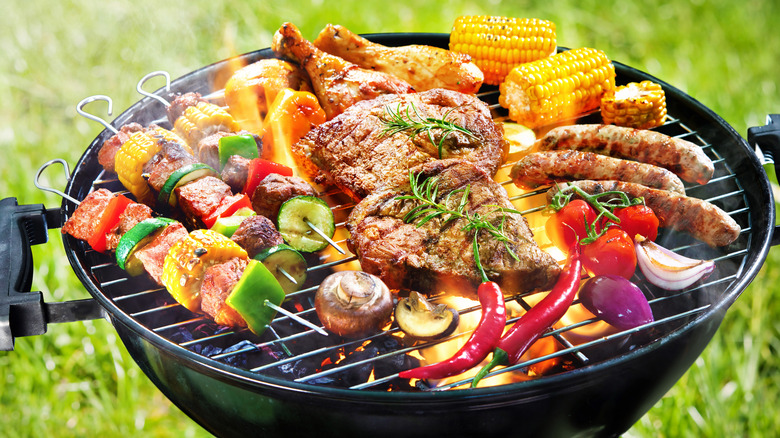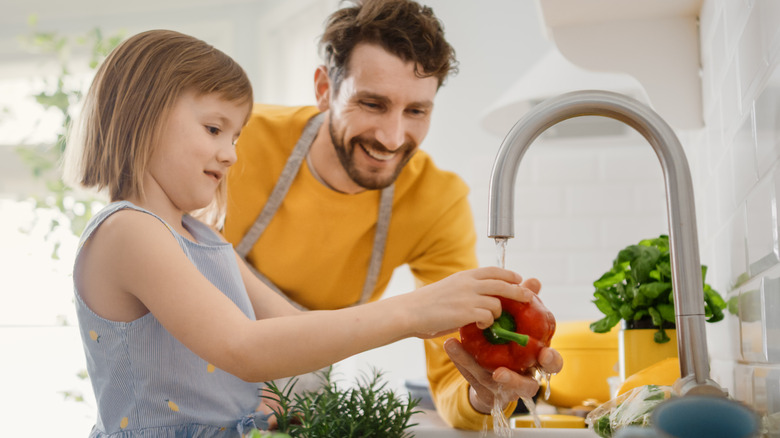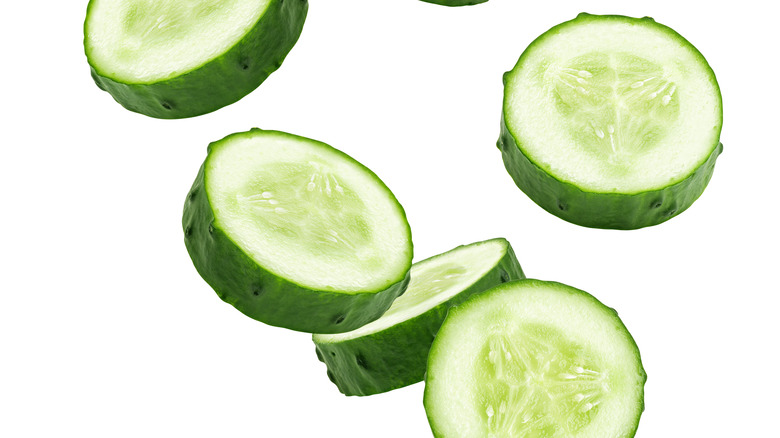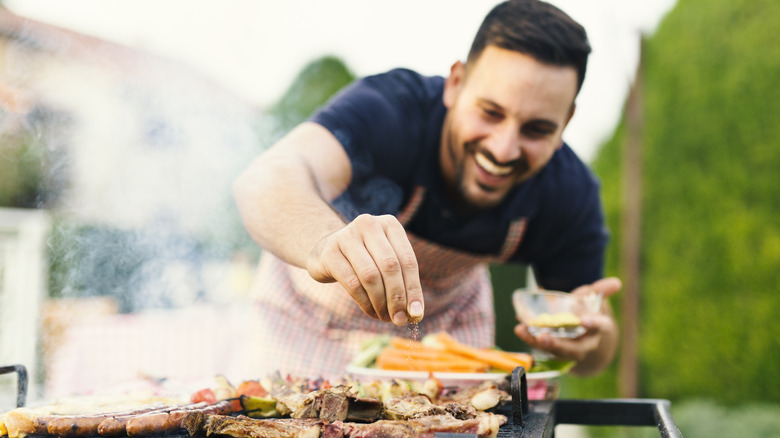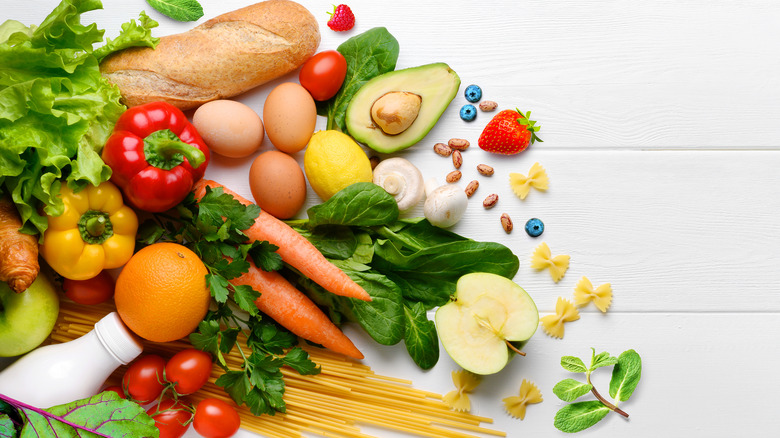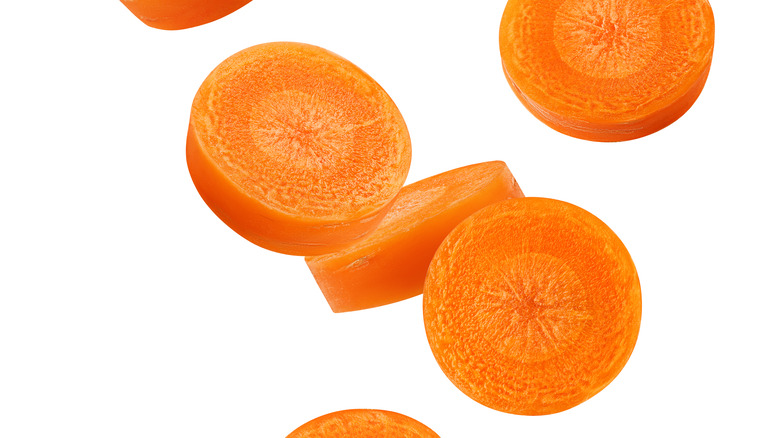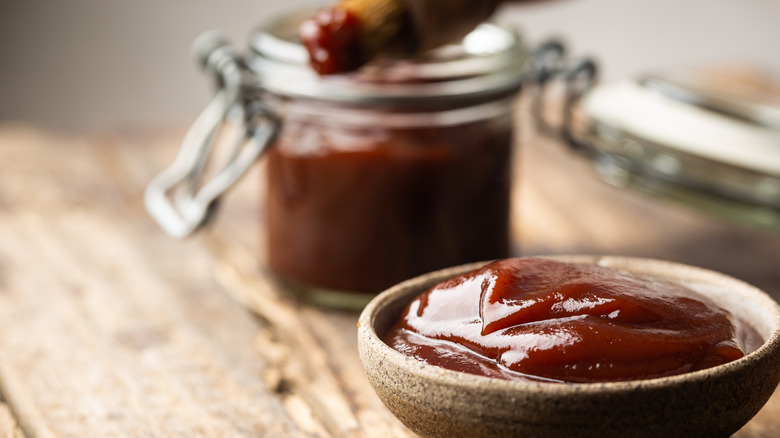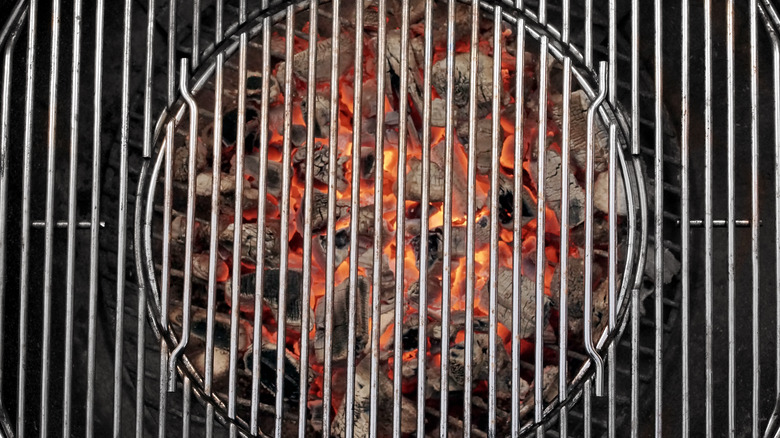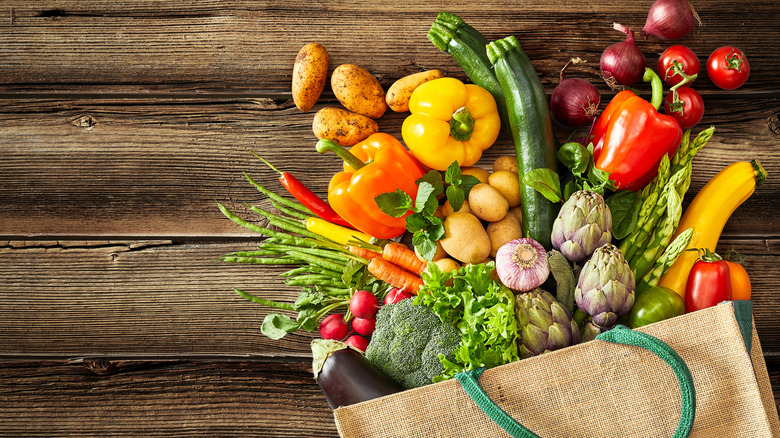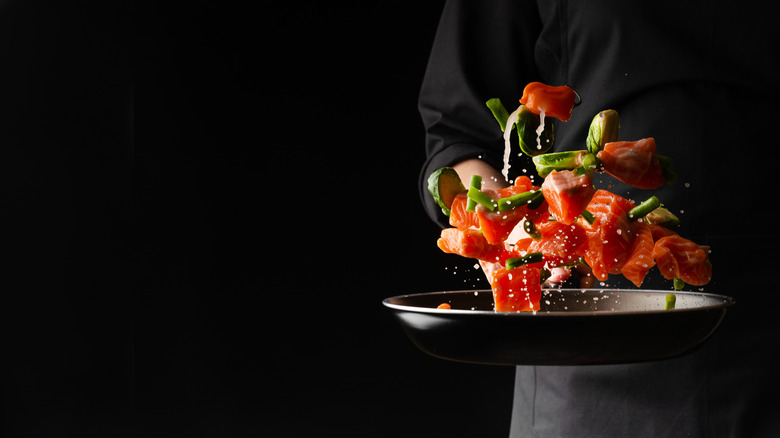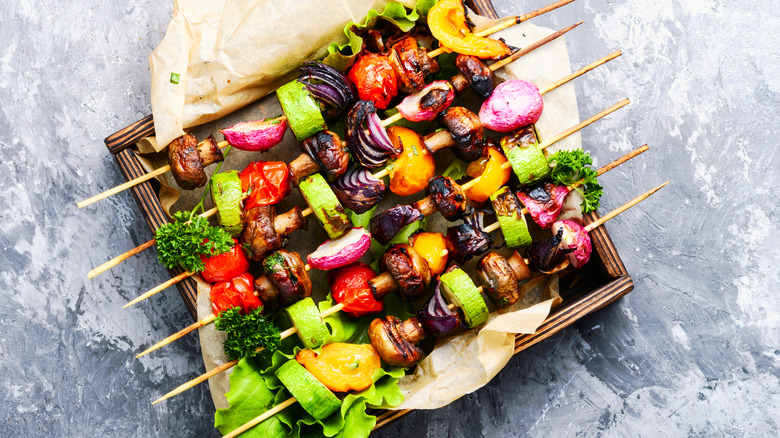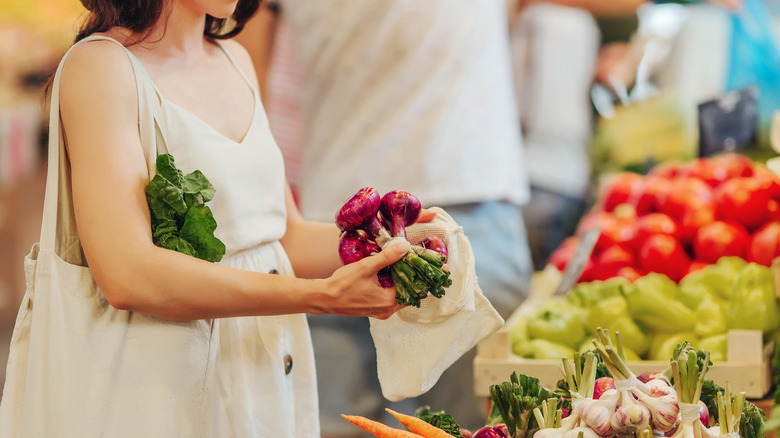Mistakes People Make When Grilling Vegetables
When planning a cookout, you may want to throw steaks, burgers, or ribs on the grill. That's great, but not everyone wants meat, given the rise of plant-based diets. Even those who do want to chow down on a steak may still want a side of something green! This is where the veggies come in. Grilling can be a great option for vegetables, as well as a way to add a smoky flavor to even the most basic of greens. The good news is that vegetables are pretty simple and straightforward to grill. Plus, once you get them right, it's easy to make them taste downright delicious.
That's not to say there aren't some mistakes people make along the way to grilled vegetable glory. It all starts with making sure you choose the best vegetables for your grill, cleaning them well, and then preparing them in a way that will ensure they're cooked to their best state. Of course, there's always flavor to consider, too.
Various as these pitfalls may seem, once you get it right, you may never eat vegetables anywhere other than your grill again! Here are some common vegetable grilling mistakes to avoid next time you throw some veggies on the grill.
Not washing the vegetables first
It may seem wild that, in today's world, this still has to be a reminder. Still, it should be said. Before you do anything else, please wash your veggies and then dry them. "Dirt, chemicals and who knows what else could be lurking on them," chef David Trotta, co-founder of Whealth Kitchen, told Mashed.
There's really no point in being healthy and eating fresh vegetables if you don't wash them and then they get you sick. At a time that health considerations are more prevalent than ever, this is a step that simply can't be skipped. "Even at Whealth Kitchen, we directly pick up crates of vegetables from our local farm partners," said Trotta. "[B]ut the fact is nothing can be safe all the time and the best and really, the only way to protect yourselves is to wash it up!" So be sure to wash your fruit and vegetables before any other step.
Slicing your veggies too thinly
When grilling vegetables, the harsh truth is that sometimes people cut their veggies too thin. "You want the vegetables to be thick enough to withstand the heat, create that nice grilled flavor, and cook all the way through," Maille mustard sommelier, chef Brandon Collins, told Mashed. If they are too thin, your vegetables can slip between the grates of your grill. "I usually aim to keep my vegetables between a half-inch to [a] three-quarters inch thick when grilling," said Collins.
So, always be mindful to cut the vegetables to a proper size before grilling. "If the vegetable piece is too thin, it will likely over cook and fall apart before you can get proper grill marks," says Jason Hawk, chef-instructor at the Institute of Culinary Education. And we all know those grill marks made for not just great flavor, but serious visual appeal, too.
Of course, if it's too thick, that's not necessarily good either. "You won't be able to cook it all the way through without excessive charring and would then need to finish cooking in an oven," said Hawk. Keep the vegetables cut to a medium size, and you should be able to cook them well on the grill alone.
Not seasoning vegetables and the grill
A common mistake people make is not oiling the grill first when grilling vegetables. "Whatever you put on the grill sticks, and your vegetables will tear apart," says food author and chef Ed Harris. "This destroys the presentation." According to Taste of Home, a properly seasoned grill grate will help keep this from happening. This process, similar to seasoning a cast-iron pan, will help keep food from sticking to the surface. You'll still have to make sure to clean the grill grate periodically.
While we're at it, you should also be seasoning your veggies — not with oil, as the grill grate needs, but with actual flavor seasonings this time. "When grilling vegetables it's better to marinate or have some kind of sauce handy to brush as you grill," said Harris. As for what you marinate with? That's all about the flavors you and your guests most enjoy.
Remember that some vegetables don't have a ton of flavor to start out with, so that seasoning or marinating is very important to make them taste their best when it comes time to plate them. So make sure to have that marinade ready!
Not drying vegetables before grilling
One thing that you probably do that you shouldn't, quite frankly, is to grill your lovely fresh vegetables just after washing them. Specifically, you may have taken wet, freshly-washed veggies straight from the kitchen to the grill. Yet, this seemingly small matter can be a big mistake. That drying step takes only seconds and will make a big difference in the final product.
"When you sauté or grill vegetables, the intention is to make use of two different scientific reactions to provide flavor to your vegetables," Matthew Smith, a chef who teaches online at Shaw Academy. The first of these reactions is called the Maillard reaction, which is basically the flavor that results from browning, The second is caramelization. "Caramelized onions, for example, are soft in texture and the flavor is sweeter and less intense," said Smith.
Any moisture on the outside of the vegetables prevents both types of browning from happening. Instead, you will have steamed vegetables that will likely become soft and lose color. No one wants to eat flavorless mush, right? Therefore, take an extra minute and be sure the veggies are dried off before they hit the grill.
Chopping vegetables too far in advance
While it may seem easier to prepare vegetables ahead of time, that presents some difficulties. Everyone has seen potatoes or other vegetables that were chopped in advance of cooking or food prep and don't look quite as fresh as when they started. "Doing this exposes the cut areas to light and air, which will destroy the nutritional value of your ingredient if left too long," said chef Smith.
Thankfully, there's a pretty easy fix and it's all about simple timing. "Simply prepare all your other mise en place first and then just before you want to begin cooking, prepare the vegetables and begin shortly afterward," said Smith. Mise en place is a chef term that means "putting in place" or "everything in its place" — that is, making sure everything is prepped and ready to go before you begin cooking.
This is yet another example of how being prepared and organized helps to make a process more seamless, will save time, and get better results.
Using too much marinade
Flavor is important, to say the least. But, don't get heavy-handed, as too much marinade can be nearly as bad as too little seasoning. "One of the most common mistakes I see when grilling vegetables is having excess marinade or oil on the product, which causes flare-ups and significant smoking," Jason Hawk, chef-instructor at the Institute of Culinary Education, told Mashed. This can change the look and taste of your veggies for the worse, unless you love eating fully carbonized veggies for some reason. Thankfully, this is easily prevented by patting off any excess marinade and not being heavy-handed with oils. No one wants greasy, soggy vegetables anyway, right?
Another option is to attempt a dry grilling technique. "It's best to dry-grill mushrooms like the Japanese do for Yakitori cooking," chef Franklin Becker told Mashed. Once the veggies are grilled, you can brush them with marinade or toss them in a heat-safe bowl with salt, olive oil, vinegar, and herbs. Cover and allow the mixture to steam, producing a beautiful vinaigrette.
For this process, you may even want to skip the ubiquitous salt, at least in the first few steps. "I like to salt the vegetables afterwards, so they do not lose too much liquid on the grill," said Becker.
Not using the right equipment
When grilling, as with many other cooking techniques, it helps to pay attention to the equipment you're using. It may seem like a grill is a grill, after all — it's ultimately a grate with heat coming from underneath — but sometimes the ingredients you are using require something different to get the best final results. And the reasons why you need to pay attention to gear can get surprisingly straightforward. For example, as food author and chef Ed Harris told Mashed, "If you're grilling something small, there's a possibility the vegetables can fall through the holes."
"Sometimes you need to use a flat top or pizza stone" or other equipment in addition to the grill, Harris said. "[It] really depends on what you are grilling and how long it needs to cook." Ultimately, it's about having the right equipment for what you are trying to do, so take a moment to look at your ingredients and consider adding some extras gear to your grill lineup.
Overcooking veggies
This might sound a little tricky but, trust us, there really isn't any rocket science to getting the cook time for your veggies just right. "The myth that we should chop vegetables in smaller sizes so that they cook faster and are easy to deal with. That is actually not true," chef Emily Perez of Kitchen Infinity told Mashed. You need to chop them in medium bits, said Perez. This will help you grill them easily and quickly, depending on your heat preference. Just be sure not to use high heat, which is more likely to both undercook and burn your vegetables at the same time.
"Medium sizes are perfect because they sit easy on the grill and you cannot overcook them making them soggy," said Perez. This size of vegetable is also a lot less likely to fall through the grate.
As part of this process, you may also need to gently remind yourself to take your time. "So grill with patience and efficiency, never in a hurry. Shortcuts do not imply when it comes to grilling or cooking," said Perez.
Not taking the time to cook everything properly
There's an old saying that patience is a virtue. While this is true in many areas of our lives, it's absolutely true when cooking, and when grilling something as delicate as cut up pieces of vegetables. "Some advice I share with all my students (with any form of cooking) is patience," Jason Hawk, chef-instructor at the Institute of Culinary Education, told Mashed.
It may be tempting to keep flipping and moving around the vegetables, especially if you are looking for something to do with your hands as you stand at the grill. But don't do it. Resist the urge to keep moving and checking the product during grilling. "Let it sit and have the time to sear properly so you don't end up with vegetables sticking to the grill and tearing, or at the very least weak grill marks," said Hawk. Leaving the vegetables sitting in their spot and getting that good sear will lead to better results in the end.
Not using a veggie skewer on the grill
When grilling vegetables, things can get pretty unwieldy. Oftentimes, you'll want to make sure to use a wood skewer to make grilling multiple vegetables more manageable. "By slicing up the veggies so that different types are approximately equal in size and shape, you can get a more evenly grilled vegetable experience," Jessica Randhawa, the chef and writer behind The Forked Spoon, told Mashed. Also, says Randhawa, preparing veggie skewers is a more convenient way to grill vegetables, as you don't have to worry about sliced vegetables falling between the grill grates.
There are a couple of extra steps to remember here. "Soak wood skewers for at least 15 minutes," Randhawa said. This ensures that the wood doesn't burn and you get the best flavor out of the grilled vegetables. You'll also need to think about which vegetables cook at similar rates. "Never place cherry tomatoes on the same veggie skewer as red onion," said Randhawa. "You'll end up with either delicious tomatoes and raw red onion or melted tomatoes and perfect red onion."
Not using the right vegetables
Not all vegetables will get the same results on the grill. Ultimately, this means that it's important to find the vegetables with the best chance of grill success. When choosing vegetables, try to find a semi-firm variety, especially as you get started with grilling. "I've found that semi-firm vegetables with good moisture content grill best, for example onions, zucchini and peppers," chef Jason Hawk told Mashed.
There aren't any vegetables Hawk would flat-out not recommend, but some will require extra processing to work on the grill. "Some, like carrots, asparagus, and waxy potatoes won't grill well from raw, but with a par-cook they will grill up nicely. Softer vegetables, like eggplant, need larger cuts and a little extra care to not break up."
If you are going to grill vegetables, may as well grill successfully! The right vegetable will lead to a better result and a tastier dinner to enjoy.
